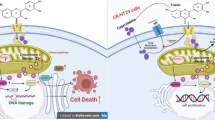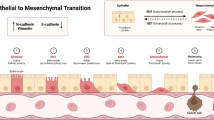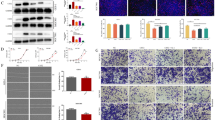Abstract
The role of matrix metalloproteinase-7 (MMP-7) in the pathogenesis of colon cancer is not understood thoroughly. Previous studies from our group have shown that the expression levels of MMP-7 were highly elevated in colorectal cancer patient specimens and were correlated with Dukes Staging, histological differentiation grade and CEA level. The goal of this study was to investigate the cellular impact of MMP-7 in colon cancer. In this study, we used the SW480 colon cancer cell lines of MMP-7 knockdown by lentivirus-mediated RNA interference as a model system to investigate the impact of MMP-7 on cell proliferation and sensitivity to 5-Fluorouracil (5-FU) and X-ray irradiation (IR). Cell proliferation and sensitivity to 5-FU and IR were measured by MTT assay and colony formation assay. Cell cycle was evaluated by flow cytometry. We showed that the down regulation of MMP-7 inhibits colon cancer cell proliferation and sensitizes tumour cells to 5-FU and IR (P < 0.05). Decreased MMP-7 expression in SW480 cells by RNA interference triggered cell cycle arrest at G1 phase (P < 0.05). Down regulation of MMP-7 may inhibit the cell proliferation of colon cancer cells and increase tumour cells sensitivity to radiotherapy and chemotherapy. RNAi-mediated silencing of MMP-7 may represent a powerful therapeutic approach for controlling human colorectal cancer growth.




Similar content being viewed by others
References
Curran S, Murray GI (2000) Matrix metalloproteinases: molecular aspects of their roles in tumour invasion and metastasis. Eur J Cancer 36:1621–1630
Nelson AR, Fingleton B, Rothenberg ML, Matrisian LM (2000) Matrix metalloproteinases: biologic activity and clinical implications. J Clin Oncol 18:1135–1149
Curran S, Murray GI (1999) Matrix metalloproteinases in tumour invasion and metastasis. J Pathol 189:300–308
Murray GI (2001) Matrix metalloproteinases: a multifunctional group of molecules. J Pathol 195:135–137
Jones LE, Humphreys MJ, Campbell F, Neoptolemos JP, Boyd MT (2004) Comprehensive analysis of matrix metalloproteinase and tissue inhibitor expression in pancreatic cancer: increased expression of matrix metalloproteinase-7 predicts poor survival. Clin Cancer Res 10:2832–2845
Saitoh Y, Yanai H, Higaki S, Nohara H, Yoshida T, Okita K (2004) Relationship between matrix metalloproteinase-7 and pit pattern in early stage colorectal cancer. Gastrointest Endosc 59:385–392
Luo H, Zhou Z, Yang L et al (2005) Clinicopathologic and prognostic significance of MMP-7 (Matrilysin) expression in human rectal cancer. Jpn J Clin Oncol 35(12):739–744
Coussens LM, Fingleton B, Matrisian LM (2002) Matrix metalloproteinases inhibitors and cancer: trials and tribulations. Science 295:2387–2391
Egeblad M, Werb Z (2002) New functions for the matrix metalloproteinases in cancer progression. Nat Rev Cancer 2(3):161–174
Leeman MF, Curran S, Murray GI (2003) New insights into the roles of matrix metalloproteinases in colorectal cancer development and progression. J Pathol 201:528–534
Rudolph-Owen LA, Chan R, Muller WJ, Matrisian LM (1998) The matrix metalloproteinase matrilysin influences early-stage mammary tumorigenesis. Cancer Res 58:5500–5506
Wilson CL, Heppner KJ, Labosky PA, Hogan BL, Matrisian LM (1997) Intestinal tumorigenesis is suppressed in mice lacking the metallo-proteinase matrilysin. Proc Natl Acad Sci USA 94:1402–1407
Almendro V, Ametller E, Garcı a-Recio S, Collazo O, Casas I et al (2009) The role of MMP7 and its cross-talk with the FAS/FASL system during the acquisition of chemoresistance to oxaliplatin. PLoS ONE 4(3):e4728
Mitsiades N, Yu WH, Poulaki V, Tsokos M, Stamenkovic I (2001) Matrix metalloproteinase-7-mediated cleavage of Fas ligand protects tumor cells from chemotherapeutic drug cytotoxicity. Cancer Res 61:577–581
Yamamoto H, Itoh F, Hinoda Y et al (1994) Expression of matrilysin mRNA in colorectal adenomas and its induction by truncated fibronectin. Biochem Biophys Res Commun 201:657–664
Fingleton BM, Heppner Goss KJ, Crawford HC, Matrisian LM (1999) Matrilysin in early stage intestinal tumorigenesis. APMIS 107:102–110
Heslin MJ, Yan J, Johnson MR, Weiss H, Diasio RB (2001) Role of matrix metalloproteinases in colorectal carcinogenesis. Ann Surg 233(6):786–792
Kitamura T, Biyajima K, Aoki M, Oshima M, Taketo MM (2009) Matrix metalloproteinase 7 is required for tumor formation, but dispensable for invasion and fibrosis in SMAD4-deficient intestinal adenocarcinomas. Lab Invest 89:98–105
Brabletz T, Jung A, Dag S, Hlubek F, Kirchner T (1999) Beta-catenin regulates the expression of the matrix metalloproteinase-7 in human colorectal cancer. Am J Pathol 155:1033–1038
Masaki T, Matsuoka H, Sugiyama M et al (2001) Matrilysin (MMP-7) as a significant determinant of malignant potential of early invasive colorectal carcinomas. Br J Cancer 84:1317–1321
Jamieson CH, Ailles LE, Dylla SJ, Muijtjens M, Jones C, Zehnder JL, Gotlib J, Li K, Manz MG, Keating A, Sawyers CL, Weissman IL (2004) Granulocyte-macrophage progenitors as candidate leukemic stem cells in blast-crisis CML. N Engl J Med 351:657–667
Woodward WA, Chen MS, Behbod F, Alfaro MP, Buchholz TA, Rosen JM (2007) Wnt/beta-catenin mediates radiation resistance of mouse mammary progenitor cells. Proc Natl Acad Sci USA 104:618–623
Klaus A, Birchmeier W (2008) Wnt signalling and its impact on development and cancer. Nat Rev Cancer 8:387–398
Chang HW, Roh JL, Jeong EJ, Lee SW, Kim SW, Choi SH, Park SK, Kim SY (2008) Wnt signaling controls radiosensitivity via cyclooxygenase-2-mediated Ku expression in head and neck cancer. Int J Cancer 122:100–107
Yang W, Yan HX, Chen L, Liu Q, He YQ, Yu LX, Zhang SH, Huang DD, Tang L, Kong XN, Chen C, Liu SQ, Wu MC, Wang HY (2008) Wnt/beta-catenin signaling contributes to activation of normal and tumorigenic liver progenitor cells. Cancer Res 68:4287–4295
Ohigashi T, Mizuno R, Nakashima J, Marumo K, Murai M (2005) Inhibition of Wnt signaling downregulates Akt activity and induces chemosensitivity in PTEN-mutated prostate cancer cells. Prostate 62:61–68
Noda T, Nagano H, Takemasa I, Yoshioka S et al (2009) Activation of Wnt/b-catenin signaling pathway induces chemoresistance to interferon-a/5-fluorouracil combination therapy for hepatocellular carcinoma. Br J Cancer 100:1647–1658
Acknowledgments
This study was supported by National Science Foundation of China (No. 30830100) and PhD. Programs Foundation of Ministry of Education of China (No. 20080610058).
Conflict of interest
The authors declare no conflict of interest.
Author information
Authors and Affiliations
Corresponding author
Rights and permissions
About this article
Cite this article
Zhang, W., Li, Y., Yang, L. et al. Knockdown of MMP-7 inhibits cell proliferation and enhances sensitivity to 5-fluorouracil and X-ray irradiation in colon cancer cells. Clin Exp Med 14, 99–106 (2014). https://doi.org/10.1007/s10238-012-0212-7
Received:
Accepted:
Published:
Issue Date:
DOI: https://doi.org/10.1007/s10238-012-0212-7




